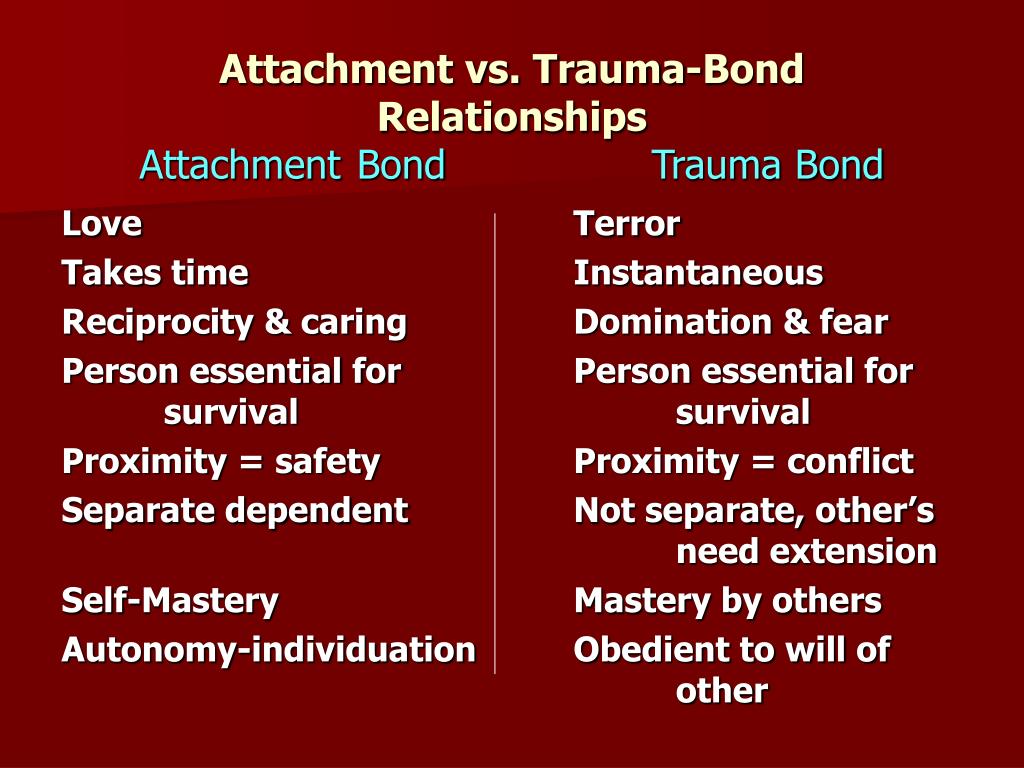

“You’re right, I’m so sorry for questioning you.”.“Wow, he still loves me and forgives me, even when I mess up.”.They may start to think along the lines of: The criticism phase is most noticeable during intense arguments or disagreements, where the abuser will likely blame their partner and the target may end up over-apologizing for things that are not their fault. This criticism can feel sudden, especially after experiencing the love bombing stage, but it is common for abusers to wait until a victim’s trust has been tested before they begin criticizing them. Once they’ve got your trust, emotional abusers may start to pick apart some of your qualities, identifying them as insignificant or problematic. In trauma bonds, the idea that you can trust an abuser in the relationship is an illusion. When confronting the abuser at this stage, you may get a lot of flack for discounting all they have done for you, which is why the love bombing stage provides an vital setup for dependency. Doubts are expected in a healthy relationship and it takes time to get to know someone–not only for what they say but also for what they do. In this stage, an abuser may purposefully test the victim’s trust and dependency on them usually leading to the target feeling guilty for questioning their partner. Providing a sense of stability and security.“Proving” that an abuser has good intentions.Fostering positive feelings and validation between the possible perpetrator and victim.Causing the victim to let their guard down and trust the abuser’s intentions.It is similar to someone saying “look what I can offer you, and no one else has or will love you like this” Allowing the abuser to prey on the victim’s emotions, deep hopes, desires and dreams.In a trauma bond, love bombing can subtly set the stage for an abusive dynamic by: Sometimes, in some abusive circumstances, the abuser may seem oblivious to their manipulation however, that is typically not the case in a trauma bond. While this dynamic typically occurs between a perpetrator and victim of abuse, it can sometimes involve other people surrounding the couple. Love bombing involves the sudden, intense attempt to create a “we” in a relationship through high praise and excessive flattery. The seven stages of trauma bonding are: 1. This progression is part of the reason this bond can profoundly impact a victim’s worldview, perception of reality, and their relationship with themselves. In the seven proposed stages of trauma bonding, often they begin as seemingly excellent relationships before gradually progressing turning into an abusive dynamic. Still they often struggle to accept it as abuse. On an intellectual level, trauma bond survivors likely know what is happening to them is wrong and can identify how painful and soul-crushing their relationship is. Existing mental health concerns, such as depression, BPD, and anxiety.People with the tendency to question themselves, even despite strong evidence that suggests they aren’t to blame.People with disorganized, anxious, or avoidant attachments.Anyone with a history of being abused in childhood or past relationships.Anyone who puts a lot of value on “the good times” and is quick to forgive.Other risk factors for trauma bonding include: It can be common for abusers to seek out strong, driven, educated, and independent thinkers so that they can make themselves feel superior when they finally break them down. People with relational and emotional trauma are typically targeted by perpetrators in a trauma bond, intentionally or otherwise. Who Is More Susceptible to Trauma Bonding? It can take survivors a long time to find the tools to detach themselves from their trauma bond, and often they stay longer than they should out of fear for their safety or livelihood, which can lead to even worse instances of abuse before they can break free. But whether the abuse is purely psychological or a combination of the two, it may feel impossible to simply “walk away” even when you are being harmed. Trauma bonding in a relationship can coincide with any physical or sexual abuse that may be present. This often occurs in romantic narcissistic relationships, but can also occur in families, friendships, or work relationships. Trauma bonding happens when an abuser uses manipulation tactics and cycles of abuse to make the victim feel dependent on them for care and validation, causing a strong attachment or bond. While it can become increasingly difficult for the victim to walk away from this vicious cycle, it is still possible to break a trauma bond, especially once you are familiar with its stages and how they impact you and your relationship. It has been suggested that there are seven stages of trauma bonding, with each stage perpetuating the cycle of trauma and pain commonly seen in abusive relationships.


 0 kommentar(er)
0 kommentar(er)
